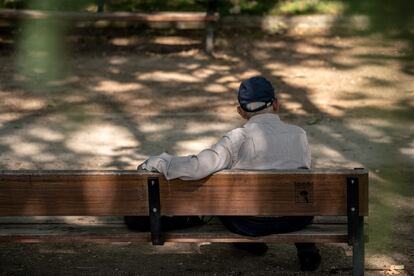A review of studies with 2.2 million people shows that loneliness increases the risk of dying
The analysis of 90 scientific investigations concludes that living alone and having few social relationships shortens life

Loneliness kills. That is not news. Experts and scientific studies have already established the connection between being alone and a shortening of life. What is new, however, is the impact of the accumulated evidence. A review of what science knows about the adverse effects of social isolation on health has found 90 studies carried out in half the world; together, they collect the data of 2.2 million people. The review also highlights the fact that some diseases, such as cardiovascular conditions and some types of cancer, progress worse when living alone.
A group of scientists from various Chinese institutions undertook the task to compile all the research that has specifically studied the relationship between loneliness or social isolation and mortality since the 1980s. As is now almost the norm in this field, they make a distinction between the subjective (loneliness, the feeling of being alone) and the objective (the reduction of social relationships, the metric of social isolation). 90% of the studies were carried out in developed countries, almost half of them in Europe. More than 2.2 million people were (or are being) observed for up to 50 years. All this makes it a sizeable sample whose results have a high statistical importance.
The review, published this Monday in the journal Nature Human Behaviour, shows that, on average, loneliness increases the risk of dying from any cause by 14%. In almost all the studies analyzed, other possible variables were controlled, such as gender, age, socioeconomic level, physical activity or previous conditions such as smoking, alcoholism or diabetes. The situation is worse when what is measured is the impact of social isolation, understood as the lack of social relationships; in that case, the risk of mortality is compounded by 32%. According to the 20 studies that examined the impact according to gender, men and women who say they feel lonely have the same risk. However, the lack of social relations aggravates the situation of men more than that of women by five percentage points.
The review authors also collected papers focusing on different diseases, particularly cardiovascular conditions and some types of cancer. With a combined sample of more than one million people, they found that social isolation increases the risk of dying from a circulatory pathology among the general population by 34%. Meanwhile, although those who feel lonely had a slight increase in their probability of dying from a heart problem, it was not significant. This result, together with that of mortality from any cause, suggests that the lack of social relationships is a better predictor of the risk of mortality than the feeling of loneliness, which is self-perceived.
The difference between loneliness and social isolation is confirmed in another part of the review, when they examine how they aggravate the evolution of cancer. While the risk of dying from this cause among the general population increased by 34% among those who had few social relationships, this percentage dropped to 9% in the case of those who felt lonely.
Although being alone and feeling lonely can be two sides of the same coin, for Maoqing Wang, a researcher at the Harbin Medical University in China and co-author of the review, “isolation is worse than loneliness.” He adds: “Loneliness has been shown to predict mental health (depression, for example) and isolation has been shown to predict cognitive and physical health.” Although there are studies that have looked at both aspects a whole, “according to our meta-analysis, the combined effect of social isolation and loneliness is no greater than the separate effects, and isolation by itself influences premature mortality more strongly.” For the Chinese scientist, “people who feel lonely but are not socially isolated have mental health stress, but can resist it due to their social networks.” This should be taken into account when designing public health policies and programs.
For Marco Inzitari, the director of Integrated Care and Research at the Pere Virgili Health Park in Barcelona, Spain, “the potency, the amount of data that this work gathers, consolidates something that we have been observing for a long time: that living in solitude increases the risk of mortality.” Regarding the factors that could explain the impact of loneliness on mortality, Inzitari mentions that those who live alone take less care of themselves and can find it more difficult to follow a healthy lifestyle. “There are also a series of physiological effects that can affect metabolism, the immune system or circulation,” says Inzitari, who is also a professor at the Open University of Catalonia. Previous research has shown how being or feeling alone increases the release of cortisol, a hormone that causes a series of cascading effects throughout the body.
Regina Gironés, coordinator of the department of oncogeriatrics of the Spanish Society of Medical Oncology (SEOM), highlights the role of hormones in the connection between loneliness and some types of cancer, such as breast cancer. “One cause may be physiological, due to the hormones that are released in people who are alone as opposed to the hormones that are released in people who have social contact and interaction.” It has been found that women who maintain social contact have a greater probability of living longer. “This has to do with the production of cortisol versus the production of happiness hormones such as oxytocin or serotonin, which become activated when we interact with other people or when we are enjoying ourselves,” Gironés concludes.
A third factor that would explain the connection between loneliness and mortality is in the head. The authors of the review mention that the incidence of mental problems like depression is higher in those who live alone. Teresa Moreno, a member of the Spanish Society of Neurology, points out that “depression accelerates the symptoms of neurodegenerative diseases, such as Alzheimer’s and Parkinson’s.” This is accompanied by the abandonment of healthy lifestyle habits. “Elderly people who live alone develop these diseases earlier,” concludes Moreno.
Geriatrician Esther Roquer, president of the Catalan Society of Geriatrics and Gerontology, illustrates how it all begins: “As you get older, you experience losses: your love, your friends. You are left alone. Frailty also arrives, you stop going out and relationships are lost. Nowadays families are smaller, which doesn’t help to fend off loneliness. You can be actually surrounded by people, like in a nursing home, but the feeling of being alone remains.”
Both Roquer and Inzitari agree on what should be done to ensure that such a prominent and avoidable mortality risk factor is, indeed, avoided. “In addition to raising awareness among the population against ageism [social discrimination due to age], social and health services should be integrated,” says the geriatrician. For Inzitari, “we must take advantage of the administrative and social fabric; here it is important to integrate the health side with the social side,” for what Roquer calls “doing a social prescription; prescribing activities just like medicines are prescribed.” They also agree that a social change is necessary because, Inzitari points out, “there is something that is deeper, and after the pandemic, once again we are forgetting about the elderly.”
As Dr. Gironés says, these data should make us reflect on the changes that the socio-family model is undergoing: “Our culture is basically family-based, and the health system relies on the figure of caregivers. This article puts the need to maintain that figure and avoid loneliness under the spotlight.”
Sign up for our weekly newsletter to get more English-language news coverage from EL PAÍS USA Edition
Tu suscripción se está usando en otro dispositivo
¿Quieres añadir otro usuario a tu suscripción?
Si continúas leyendo en este dispositivo, no se podrá leer en el otro.
FlechaTu suscripción se está usando en otro dispositivo y solo puedes acceder a EL PAÍS desde un dispositivo a la vez.
Si quieres compartir tu cuenta, cambia tu suscripción a la modalidad Premium, así podrás añadir otro usuario. Cada uno accederá con su propia cuenta de email, lo que os permitirá personalizar vuestra experiencia en EL PAÍS.
¿Tienes una suscripción de empresa? Accede aquí para contratar más cuentas.
En el caso de no saber quién está usando tu cuenta, te recomendamos cambiar tu contraseña aquí.
Si decides continuar compartiendo tu cuenta, este mensaje se mostrará en tu dispositivo y en el de la otra persona que está usando tu cuenta de forma indefinida, afectando a tu experiencia de lectura. Puedes consultar aquí los términos y condiciones de la suscripción digital.









































